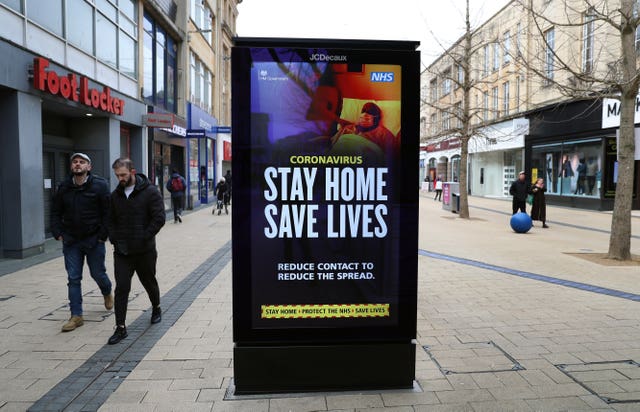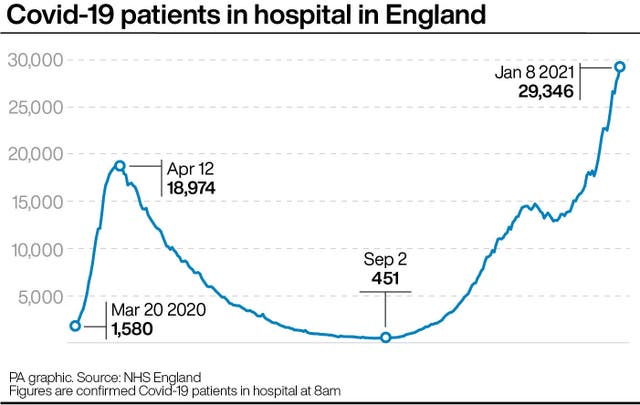Situation to get worse before improving, doctors warn as UK hits record highs
On Friday the UK recorded its highest number of Covid-19 deaths reported on a single day since the pandemic began.

Doctors have warned that pressure on the NHS could get worse in the coming weeks, as figures for cases, hospital admissions and deaths hit record highs.
The Government has doubled down on its “stay at home” message by launching a new advert, fronted by England’s chief medical officer Professor Chris Whitty, urging everyone in England to “act like you’ve got” coronavirus.
The Queen and Duke of Edinburgh received their Covid-19 vaccinations on Saturday, Buckingham Palace said.
A royal source confirmed the injections were administered by a royal household doctor at Windsor Castle.
A day earlier, the UK recorded the highest number of Covid-19 deaths reported on a single day since the pandemic began.
The Government said a further 1,325 people had died within 28 days of testing positive for Covid-19, bringing the UK total to 79,833.
There were a further 68,053 lab-confirmed cases of coronavirus in the UK, the highest figure reported in a single day since the start of mass testing last May.

Cases were estimated to have been as high as 100,000 per day at the peak of the first wave in April.
But scientists advising the Government estimate there are currently more than 100,000 new infections per day and possibly higher than 150,000 which they believe puts the current number of daily cases at a higher level than ever during the pandemic.
They believe the current lockdown may lead to a plateau of cases of coronavirus across the UK rather than the dramatic cut seen following the March and April lockdown.
Government death figures continue to be affected by a lag in the publication of recent data and will contain some deaths that took place over the Christmas and New Year period that have only just been reported.
Separate figures published by the UK’s statistics agencies for deaths where Covid-19 has been mentioned on the death certificate, together with additional data on deaths that have occurred in recent days, show there have now been 95,000 deaths involving Covid-19 in the UK.
The number of Covid-19 patients in hospital in England stood at a record 29,346 as of 8am on Friday, up by 30% from a week ago, while admissions also hit a new high, according to NHS England figures.
Things are likely to get worse before they get better for the health service, according to Dr Simon Walsh, deputy chair of the British Medical Association’s consultants committee.
The London-based emergency care doctor said the epidemiology from the previous wave indicates the situation is likely to worsen over the next two to three weeks.
He told BBC Breakfast: “I’m afraid all of us who are working on the front line believe, and this is based on the evidence I’m afraid, that it is going to get worse before it gets better.”
Dr Justin Varney, director of public health at Birmingham City Council, said hospitals had still not seen the full extent of patients who caught coronavirus over Christmas.
The former GP told BBC Radio 4’s Today: “We still haven’t seen the impact in the NHS of the rapid rise that we saw around December 28-29 after the Christmas bubble and after we started to see the new variant arriving in the region.
“It is going to get a lot, lot worse unless we really get this under control but some of that is already baked into the system and it is going to play out over the next week or two.”
The new Government advertising campaign will run across TV, radio, newspapers and on social media and will feature images of patients in hospital.
Prof Whitty said: “Vaccines give clear hope for the future, but for now we must all stay home, protect the NHS and save lives.”
Prime Minister Boris Johnson added: “I know the last year has taken its toll – but your compliance is now more vital than ever.”
But the current lockdown has been branded “too lax” by a member of the Scientific Advisory Group for Emergencies (Sage).
Susan Michie, professor of health psychology at University College London, said there is still “a lot of household contact” and that the “wide definition of critical workers” means “30-50% of (school) classes (are) full-up”.
Prof Michie, who is also part of Independent Sage, told Today: “It is definitely too lax, because if you think about it and compare ourselves with March, what do we have now?
“We have the winter season and the virus survives longer in the cold, plus people spend more time indoors and we know aerosol transmission, which happens indoors, is a very big source of transmission for this virus.
“And secondly we have this new variant which is 50-70% more infectious. You put those two things together, alongside the NHS being in crisis, we should have a stricter rather than less strict lockdown than we had back in March.”
Professor Robert West, a participant in the Scientific Pandemic Influenza Group on Behaviours (SPI-B) and also part of Independent Sage, echoed her words, saying the current lockdown rules are “still allowing a lot of activity which is spreading the virus”.
Asked if he thinks they should change, he told BBC News: “Yes, I do. Not just me. I think probably most of the people I talk to, epidemiologists, and medical scientists and virologists.”

With the current lockdown and vaccine rollout, deaths from coronavirus are expected to start dropping in February, while hospital admissions should fall after that.
Coronavirus cases are expected to drop in the spring due to vaccination plus the fact people spend more time outdoors, making it harder for the virus to spread.
More than half of all major hospital trusts in England currently have more Covid-19 patients than at the peak of the first wave.
Hospitals are also seeing far more younger people than during the first wave, scientists said.
In London, mayor Sadiq Khan declared a “major incident” as the spread of coronavirus threatens to “overwhelm” the capital’s hospitals.
A “major incident” means the “severity of the consequences” associated with it are “likely to constrain or complicate the ability of responders to resource and manage the incident”.
NHS England figures showed the number of Covid patients in London hospitals stands at 7,277, up 32% on the previous week.
The Office for National Statistics (ONS) said an estimated one in 70 people in private households in Wales had Covid-19 between December 27 and January 2 – the equivalent of 44,100 people, or 1.45% of the population.

This compares with an estimated one in 50 people in England during the same period.
Separate estimates by the ONS suggest around one in 115 people in private households in Scotland had Covid-19 in that period while in Northern Ireland, it was an estimated one in 200 people.
Around eight in 10 recent positive cases of Covid-19 in London and eastern England could be the new variant discovered in the UK, according to the ONS.
The approval of the Moderna vaccine by the Medicines and Healthcare products Regulatory Agency (MHRA) on Friday means the UK should have three vaccines to use when it comes on stream in spring.
Earlier this week Mr Johnson suggested the limiting factor in expanding the UK’s vaccine rollout is waiting for batches of the jab to be tested.
Independent batch testing for the Oxford/AstraZeneca vaccine takes around four days, the National Institute for Biological Standards and Control said.





